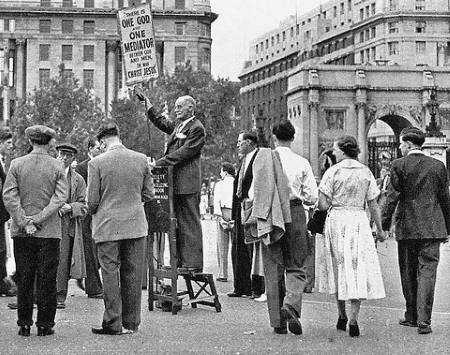Radio actuality recordings
A unique collection of original BBC and other radio actuality recordings brings to life the London of the 1920s to the 1950s. These sounds were captured at street markets, fairgrounds, skittle alleys, auction houses, hopfields and elsewhere.
Religious meetings Speakers Corner 1939
‘IT’S LIKE looking at London with your ears’, explained John Betjeman at the start of his 1968 Radio 4 broadcast Scenes that are brightest: London before the motor car. The programme evoked the sense of a vanished city through Betjeman’s pleasantly meandering commentary, interspersed with actuality recordings and interviews from the BBC’s archives.
Scenes that are brightest is still under copyright, so can’t be reproduced in its entirety here, but the actuality recordings date from the 1930s to the 1950s and so have been extracted. Part of the programme’s value is that at least two of these recordings appear to exist nowhere else – catalogue errors may mean that they are now all but impossible to find.
One of them, featuring religious meetings at Speakers Corner in Hyde Park, is reproduced here and most likely dates to 1939 or slightly later. In Scenes that are brightest, Betjeman introduces the recording as a contrast with his own reminiscences about the churchmanship of wealthy and influential people. (The photograph below shows the Rev. J. Alston Campbell with his placard at Speakers Corner in 1938, and comes from Leonard Bentley’s photo collection on Flickr.)

The recording begins with a small crowd singing Joseph Carlson’s hymn If You Want Joy, Real Joy, Wonderful Joy, written in 1939. Then a woman addresses Speakers Corner with gusto, admitting that she has been away for a while in ‘the house’, possibly a reference to Holloway women’s prison.
The theme of redemption through Christ from a criminal way of life was heard at Speakers Corner into recent times. A pitch manned by the Christian Police Association had ex-offenders tell of their former lives and subsequent transformation, although they were often flanked on either side by an Association member as if there were doubts as to whether old habits had been entirely left behind.
Next there’s a quick change of scene, perhaps the result of a crossfade by the programme editor in 1968, to a man leading his flock in singing the Salvation Army hymn Take Jesus to all the world. The recording ends with the sound of horse’s hooves, which Betjeman states came from riders passing by on Hyde Park’s Rotten Row.
Recording © copyright BBC. Audio digitisation and restoration by the London Sound Survey. Many thanks to BBC Worldwide for granting permission to reproduce this recording here.